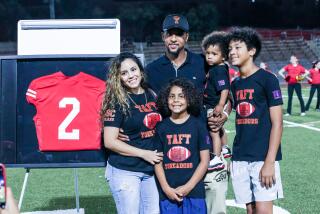Prep Voices
- Share via
Nobody’s perfect.
Years ago, our sports heroes were admired solely for what they accomplished on the playing field. Sure, they had foibles and faults--just like their modern counterparts--but we were usually kept in the dark about their off-field exploits.
What used to be considered the private part of an athlete’s life--perhaps kept that way through a gentlemen’s agreement between player and reporter--is today made public as competing newspapers, magazines, TV and radio stations vie for the “exclusive” story.
Athletes aren’t the only ones who undergo such scrutiny; anybody who stands in the public spotlight must accept being held to a higher standard by admirers.
In a TV commercial, basketball superstar Charles Barkley said he didn’t want to be a role model. Olympic silver medalist figure skater Nancy Kerrigan echoed Sir Charles’ sentiments during a TV interview not long ago.
But many professional and amateur athletes are looked up to by young people hungry to find someone to emulate. Is it fair to expect any athlete to serve as a role model?
It might not be fair to expect anybody to serve as a role model. But young people will continue to look up to someone, to hang on their every word and, perhaps, to copy their behavior. And that’s always going to come with the territory of being a star.
Emulating Heroes Gives Kids Incentive
Michele Laughlin, Youth League Coach, Rancho Santa Margarita: YES
It’s unrealistic for today’s prominent athletes to expect that they simply have to go on TV and say they don’t want to be role models. Just because they don’t want to be role models doesn’t mean children won’t look up to them.
Most young people today don’t have anyone to look up to because the news is filled with all the bad things people do.
Because of the tremendous effort it takes professional athletes such as Charles Barkley and Nancy Kerrigan to stay on top, it’s an excellent idea for children to emulate them. Athletes should consider this before making statements distancing themselves from the term “role model.” Most children look up to professional athletes, regardless of what the athletes say.
It’s important for kids to look up to athletes because it is quite an accomplishment to become a professional athlete in today’s world. In addition to talent, it takes hard work, dedication and a belief in yourself to succeed--all traits we want to foster in our children.
Athletes have to expect children will look up to them as role models if they use their success to gain lucrative contracts with major companies who cater to children--such as Disney or sporting goods companies--and act in a more responsible manner.
As a soccer coach in the American Youth Soccer Organization, I have young players frequently tell me they want to grow up to be like Michael Jordan, Nancy Kerrigan, Wayne Gretzky or Julie Foudy (a standout on the U.S. women’s national soccer team who got her start playing AYSO and club soccer and was county player of the year for three seasons at Mission Viejo High in the ‘80s). Most of these children look up to professional athletes, not someone who is almost anonymous to them, like the President. Their role models are the successful people they see on TV frequently--in commercials or at sporting events--the professional athlete.
With the World Cup Soccer Games coming to Los Angeles and the U.S. team practicing in Mission Viejo, I take every opportunity to tell my players about the achievements of our local sports figures and the generous contributions they make to the community. It gives the children an incentive to do their very best because they realize that someone local, from their city, has made the dream come true.
More to Read
Go beyond the scoreboard
Get the latest on L.A.'s teams in the daily Sports Report newsletter.
You may occasionally receive promotional content from the Los Angeles Times.






